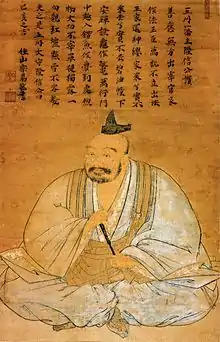Ryūzōji Takanobu
Ryūzōji Takanobu (龍造寺 隆信, March 24, 1530 – May 4, 1584) was a Japanese daimyō in Hizen Province during the Sengoku period.[1] Takanobu was the head of the Ryūzōji clan.[2]
Ryūzōji Takanobu | |
|---|---|
| 龍造寺隆信 | |
 Portrait of Ryūzōji Takanobu | |
| Born | 1529 |
| Died | 1584 |
| Nationality | Japanese |
| Children | Ryūzōji Masaie, Egami Ietane, Gotō Ienobu |
| Parent |
|
| Relatives | Ryūzōji Naganobu (brother) Ryūzōji Nobuchika (brother) |
Biography
Takanobu was the grandson of Ryūzōji Iekane (1454-1546).[3]
Ryūzōji Takanobu is known for expanding his clan's holdings. He took land from the Shōni clan. In 1578, Takanobu conquered almost all of Hizen Province.[2] The following year, the Ryūzōji clan advanced to Chikuzen and Buzen.[2] In 1580, Takanobu retired in Suko castle but he retained the real power until his death.[4]
In 1584, Ryūzōji retainer Arima Harunobu split from the clan.[2] Seizing upon this opportunity, several of the local small clans in the Shimabara Peninsula also rose up in arms. Takanobu personally led an army of around 30,000 against the Shimazu-Arima, but was killed in the Battle of Okitanawate by Shimazu Iehisa's army.[2][3]
Ryūzōji Masaie (1556–1607) was the son of Takanobu.[5] Following Takanobu's death, Ryūzōji clan was taken over by Takanobu's chief retainer Nabeshima Naoshige.[6]
References
- Papinot, Jacques Edmond Joseph. (1906). Dictionnaire d’histoire et de géographie du Japon; Papinot, (2003). "Ryūzōji", Nobiliare du Japon, p. 50 [PDF 54 of 80]; retrieved 2013-5-2.
- "日本大百科全書(ニッポニカ)「龍造寺隆信」の解説". kotobank. Retrieved 25 October 2021.
- Turnbull, Stephen (1998). The Samurai Sourcebook. London: Cassell & Co. pp. 74, 234–235. ISBN 9781854095237.
- "Ryūzōji Takanobu". Shiraishi town official. Retrieved 31 October 2021.
- Nussbaum, Louis-Frédéric. (2005). "Ryūzōji" in Japan Encyclopedia, p. 802.
- "Nabeshima Naoshigeの解説". kotobank. Retrieved 25 October 2021.
Further reading